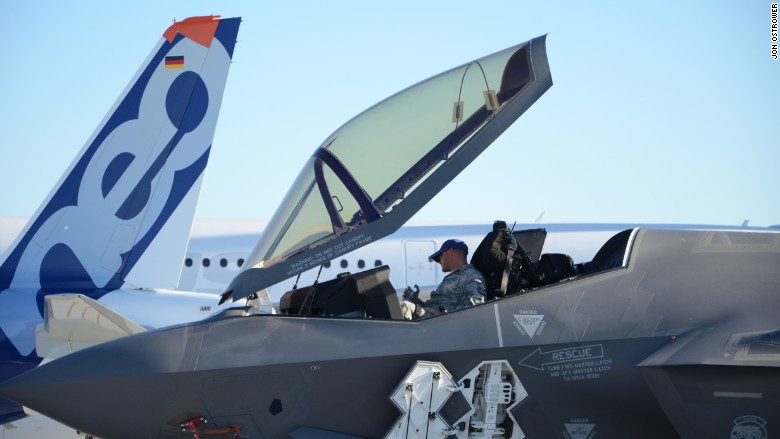
Two of the biggest suppliers to Boeing and Airbus are getting together -- and it's mostly because you want cheaper plane tickets.
United Technologies (UTX), a conglomerate that makes equipment for the aerospace and building industries, said late Monday it's buying high-tech aerospace and defense electronics supplier Rockwell Collins (COL) for $23 billion.
The combined company would have annual sales of around $34 billion, making it the world's fourth largest aerospace firm by revenue after Boeing (BA), Airbus (EADSF) and Lockheed Martin (LMT), according to industry website Flight Global. And its market cap of $115 billion would eclipse those of Airbus and Lockheed.
United Technologies' businesses include Pratt & Whitney, which makes aircraft engines for commercial passenger planes and military jets like Lockheed's F-35 fighter.
Related: Boeing reorganizes into three parts: Airliners, fighters and spare parts
The deal creates an aviation giant that will supply everything from civilian and military jet engines and landing gear to elaborate business class seats and cockpit electronics.
As fliers demand ever cheaper tickets, airlines are looking for better deals from plane makers like Boeing and Airbus. The giant manufacturers have been locked in battle for decades, fighting for deal after deal, which executives say increasingly come down to the final price tag, not just the performance of each jet.

That fierce competition -- along with massive delays and cost overruns at aircraft programs like Boeing's 787 Dreamliner and Airbus's A380 -- have prompted the plane makers to seek aggressive cost cuts from suppliers.
"Both Boeing and Airbus have been very active in trying to reduce the costs in their supply chains, and have been looking to smaller suppliers to build leverage over these larger ones," said Ellis Taylor, Asia Finance Editor for Flight Global.
At Boeing, for example, those efforts have delivered big gains for its shareholders. But they have also triggered a wave of mergers among aerospace suppliers who are trying to adapt to the shifting landscape.
Related: Aviation giant Rockwell Collins to buy B/E Aerospace
Will Boeing and Airbus endorse?
Whether Boeing and Airbus will bless the final deal is yet to be seen. The new United Technologies with Rockwell under its umbrella gives the conglomerate more clout against the plane makers in two key battlegrounds: parts for new planes and spares.
Companies like Rockwell and United Technologies make a big chunk of their money on the sale of spare parts and services to airlines and the military. Boeing has now set up a new services business of its own to win back some of that business from its suppliers.
Boeing is taking a tough line. The company said in a statement Tuesday that it intends to "take a hard look" at the merger and "until we receive more details, we are skeptical that it would be in the best interest of—or add value to—our customers and industry."
Boeing said if it determines the deal isn't in the interest of its customers, employees, other suppliers, shareholders and overall competitiveness, it "would intend to exercise our contractual rights and pursue the appropriate regulatory options to protect our interests."
The aerospace giant said both United Technologies and Rockwell's "first priority should be delivering on existing cost, schedule and quality commitments for their customers and ours."
Related: Boeing's new electronics unit may cost its suppliers
Boeing and United Technologies have publicly butted heads over Boeing's aggressive cost-cutting drive on the parts it buys. The two companies eventually worked it out, but not before the plane maker kicked United Technologies' landing gear off of its 777 and 777X aircraft.
Rockwell last year bought one of the largest airline seat manufacturers and has won major contracts from Boeing, giving it an enviable position on all of Boeing's jetliners. But Boeing last month said it would start developing its own electronics, potentially putting Rockwell's core business at risk over the long term.
The United Technologies-Rockwell tie-up comes as Boeing revs up preparations for a new twin-aisle jet, which will kick off a scramble among suppliers to win contracts ahead of the plane's expected airline debut of around 2025.
Related: World gets first peek at Boeing '797'
United Technologies has drawn the ire of Airbus in the past year over delivery delays and reliability issues with its new geared turbofan engine for the plane maker's single-aisle A320neo jetliners.
Asked about the planned merger, an Airbus spokesman said the company hopes any deal-making won't distract the Pratt & Whitney parent from its "top operational priority" of dealing with the engine delivery delays.

